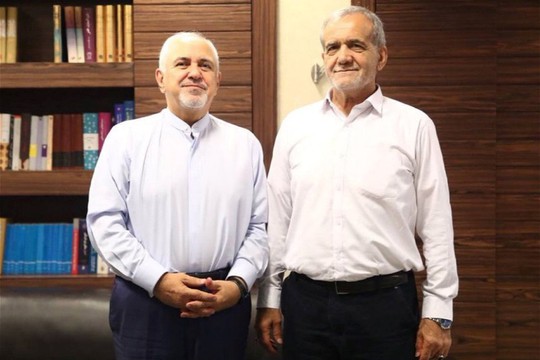Iranian President Massoud Pezeshkian (right) with former Foreign Minister Mohammad Javad Zarif, appointed as the ‘Strategic Deputy’.
Photo: ABCmedia
All in all, in the rapidly evolving regional security balance, the Gulf monarchies, which watch Iran closely, are sensing a paradigm shift. The bottom line is, Pezeshkian’s call for regional unity to counter extremist influences. He said, “Radical voices should not drown out the voices of the nearly two billion peace-loving Muslims. Islam is a religion of peace,” notes M.K. Bhadrakumar, Indian Ambassador and prominent international observer.
Amidst the cascading tensions in the Middle East following the assassination of Hamas leader Ismail Haniyeh by Israel and vows of ‘revenge’ in Tehran, the new government under President Massoud Pezeshkian, sworn in on Tuesday, made its first move on Thursday. Former Iranian Foreign Minister Mohammad Javad Zarif was appointed as the ‘Strategic Deputy’ of the Iranian president entrusting him with the responsibility of the Center for Strategic Studies (CSS).
Zarif’s long exposure to the American policymaking circles during his extended tenure as ambassador to the UN and his active social networking in New York are his strategic assets. Zarif is a familiar face and is highly regarded in the western capitals.
Pezeshkian’s election victory suggests that reformism has transformed as a major current in Iran’s mainstream politics. The Iranian dialectic is fraught with consequences for Israel and the US insofar as their old calculus to fuel dissent and trigger social unrest in Iran won’t work anymore. To be sure, the spectre of a constructive engagement between the West and Iran haunts Israel.
The Saudi Crown Prince Mohammed bin Salman congratulated Pezeshkian by phone on his election victory last month to express his satisfaction with the strengthening of relations between Iran and Saudi Arabia in various fields, and stressing the need to strengthen the relations as much as possible. The Saudi move registered the hope and expectation that they can do business with the new government in Tehran.
Similarly, the Arab League delisting of Hezbollah recently would speak to the extent to which Saudi Arabia and other Arab states are moving away from Washington’s anti-Iranian positions. The regional states are increasingly accommodative of Iran and are trying to find ways to “share the neighbourhood” with Tehran — to borrow the famous words of then-US President Barack Obama.
A war with Iran will be very unlike Israel’s previous wars with the Arab states. It will be open-ended until Israel allows the creation of a Palestinian state. Israel’s capacity to retaliate will steadily get depleted, as happened vis-a-vis Hezbollah. The medium and long-term advantage lies with Iran, a much bigger country than Israel, since it will be a war on multiple fronts with non-state actors.
On the other hand, it is difficult to believe that Israel acted on its own to attack Iran’s sovereignty, which is tantamount to an act of war, without some sort of US approval. It is this ‘known unknown’ factor that makes the situation very dangerous. Iran’s supreme leader Ayatollah Khamenei has already ordered a direct strike on Israeli territory.
Netanyahu is confident about US support, which was manifest in the warm welcome he received during his recent trip to Washington. Possibly, it was this support that allowed Netanyahu to cut short his visit to the US, return home and forthwith venture into such an aggravation of the situation.
If so, the US is coordinating the situation, but then, US-Israeli history is also one of the tail wagging the dog, more often than not.
read more in our Telegram-channel https://t.me/The_International_Affairs

 11:23 05.08.2024 •
11:23 05.08.2024 •























